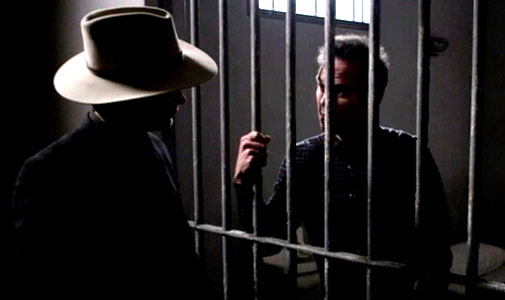
Harlan County, Kentucky, is real. But it's also the fictional home to FX's
Justified, televised Tuesday nights at 10 ET. The fictional Harlan has its share of sly waitresses and slicked-back lawmen in stiff, shiny boots. It's also where scruffy critters of all ilk lurk around the dimly lit corners of the screen -- smart, shifty criminals who need to be rooted out of the hollows of the Kentucky hills. Or, more correctly, the "hollers."
And it's just that kind of attention to backwoods slang -- that hillbilly beat-poetry -- that is at the heart of this weekly drama series. Characters reel off home-spun phrases and threats as smoothly, and easily, as a snake sliding from under the wood pile.
Earlier this season, Timothy Olyphant's U.S. Deputy Marshal Rayland Givens said to a State Trooper, as the cop pulled up with his kids in the back of the cruiser: "What is this, bring your kids to work day?"
The trooper mutters back, "It's 'Wife Sicker'n Sh*t Day.' "
Givens says, "Guess that explains the fried chicken for breakfast."
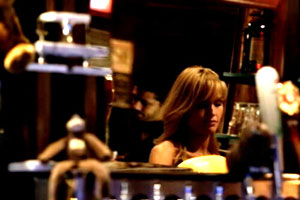
And on this Tuesday's new "Guy Walks Into a Bar" episode, a pretty bar owner gets the drop on this year's evil menace, Robert Quarles (Neal McDonough), with a pump-action shotgun. She casually warns him, "You think I can't paint that wall with you from here, you are sorely mistaken."
Justified works, in large part, because of the sound of it. (Southland comes to mind as another show committed to the authenticity of the voice as a way of branding its own world.)
And those down-home dialectics are as vital to the feel of the show as the noteworthy acting, writing and art direction -- all of which, currently, are some of the best on television.
Now approaching the end of its third season, Justified is the vision of producer Graham Yost, who has embodied and adapted the economy and wit of crime novelist Elmore Leonard's style and lead character Givens, first presented in the short story "Fire in the Hole."
Leonard, one of the all-time great crime writers, is perhaps best known for his 1995 screenplay Get Shorty, about thugs running amok in Hollywood. It's another of his hundreds of dramas where dialogue is the star. A consulting writer on Justified, Leonard is now into his 80s, but time hasn't dulled his ear to what sounds the best -- and the most terse.
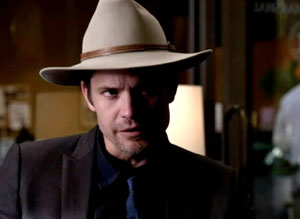
He's well known for making his characters speak in a lifelike fashion, and also for his perseverence in achieving that aim. As he has been famously, and frequently, quoted: "If it sounds like writing, I rewrite it."
That the characters in Justified, therefore, speak in short spurts, and move the action along in bursts, is no great surprise.
Nor are the show's accomplishments as a dramatic TV work surprising. Justified was selected for a Peabody Award last year, and Olyphant was nominated for a Best Dramatic Actor Emmy in 2010.
For those of us who are fans of such things, Justified also has one of the better opening montage sequences going, and a great musical theme song, called "Long Hard Times to Come," that's a gritty mash-up of banjo, rap and resonator guitar.
One enjoyable aspect of crime noir is that the good guys are always one step ahead of everyone else, and often, they're a little shady -- getting things done outside the lines of the law, and getting away with it.
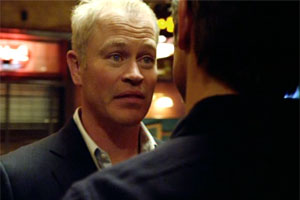
Justified, though, is not all country games. As the season begins to close, we're seeing some disturbing lows that the Quarles character will descend to, as a criminal and as a human being.
It's not easy to watch. But it's a credit to McDonough's intensity and charisma, as well as to the writers' skill way of weaving everything together, that the conflicts and showdowns on Justified never feels gratuitous, or obvious -- but essential, in a crime story where there are some very bad things hiding under the rocks.
But out in the light, the lawmen display smarts and bravery. They're quick with a gun, and even quicker with a wisecrack -- all drawn at just the right time.
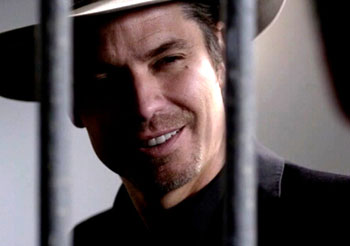
Olyphant's Deputy Givens has the most fun with it. When he brings in a friend to pose as an especially imposing bomb specialist to intimidate a crooked, small town Sheriff, he gets the man's silence do the talking.
"Agent Masters is one of the best," says Givens, pointing to his hulking cohort.
The sheriff glares, and looks the large man up and down nervously.
"Is that why he doesn't talk?" he asks Givens. "Doesn't smile? Just stands in my doorway like a big, hot steaming pile?"
Givens smiles, and looks down at the floor.
"Social awkwardness," he replies simply, "is often the curse of genius."
And lines of dialogue such as that, delivered just that way -- that's a little touch of genius, too.